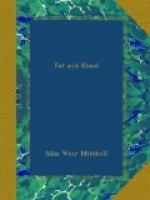Nothing is more common in practice than to see a young woman who falls below the health-standard, loses color and plumpness, is tired all the time, by and by has a tender spine, and soon or late enacts the whole varied drama of hysteria. As one or other set of symptoms is prominent she gets the appropriate label, and sometimes she continues to exhibit only the single phase of nervous exhaustion or of spinal irritation. Far more often she runs the gauntlet of nerve-doctors, gynaecologists, plaster jackets, braces, water-treatment, and all the fantastic variety of other cures.
It will be worth while to linger here a little and more sharply delineate the classes of cases I have just named.
I see every week—almost every day—women who when asked what is the matter reply, “Oh, I have nervous exhaustion.” When further questioned, they answer that everything tires them. Now, it is vain to speak of all of these cases as hysterical, or as merely mimetic. It is quite sure that in the graver examples exercise quickens the pulse curiously, the tire shows in the face, or sometimes diarrhoea or nausea follows exertion, and though while under excitement or in the presence of some dominant motive they can do a good deal, the exhaustion which ensues is out of proportion to the exercise used.
I have rarely seen such a case which was not more or less lacking in color and which had not lost flesh; the exceptions being those troublesome instances of fat anaemic people which I shall by and by speak of more fully.
Perhaps a sketch of one of these cases will be better than any list of symptoms. A woman, most often between twenty and thirty years of age, undergoes a season of trial or encounters some prolonged strain. She may have undertaken the hard task of nursing a relative, and have gone through this severe duty with the addition of emotional excitement, swayed by hopes and fears, and forgetful of self and of what every one needs in the way of air and food and change when attempting this most trying task. In another set of cases an illness is the cause, and she never rallies entirely, or else some local uterine trouble starts the mischief, and, although this is cured, the doctor wonders that his patient does not get fat and ruddy again.
But, no matter how it comes about, whether from illness, anxiety, or prolonged physical effort, the woman grows pale and thin, eats little, or if she eats does not profit by it. Everything wearies her,—to sew, to write, to read, to walk,—and by and by the sofa or the bed is her only comfort. Every effort is paid for dearly, and she describes herself as aching and sore, as sleeping ill and awaking unrefreshed, and as needing constant stimulus and endless tonics. Then comes the mischievous role of bromides, opium, chloral, and brandy. If the case did not begin with uterine troubles, they soon appear, and are usually treated in vain if the general means employed to build up the bodily health fail,




